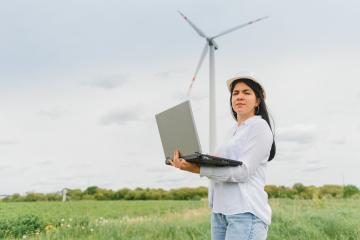
This webinar explores why gender equality is central to a just transition and thriving green economies as well as to biodiversity, ecosystems and natural capital. It spotlights burdens and barriers that impact meaningful participation of women, as well as existing initiatives to take action for gender equality in the context of inclusive green economic transformation. It features voices from the recently-launched GGKP Gender Expert Group and was organized jointly by the GGKP and the Deutsche Gesellschaft für Internationale Zusammenarbeit (GIZ).
Discussion questions:
- Why is gender equality essential for thriving, inclusive green economies?
- What are the main barriers to women's full participation, and how can we enable full and equal participation of women in an inclusive green economy?
- Are there success stories for a gender equal just transition? What are the lessons learned?
- How do systems, structures and procedures have to change to enable power-sharing at all levels of decision making, implementation and monitoring?
The GGKP has held two webinars on gender to date - you can watch the recordings at: Sustainability After COVID-19: Building gender equality into the response (2020) and Making Gender-Responsive Green Growth Happen (2019).
Recording
Speakers

Lorena Aguilar, Former Vice-Minister of Foreign Affairs, Costa Rica
Simon Anderson, Senior Fellow, Strategy and Learning Group, International Institute for Environment and Development (IIED)
Susannah Fisher, Researcher, University College London (UCL)
Betty Mkatshwa, Senior Analyst, South African Competition Commission
Cecilia Ugaz Estrada, Director of Gender Equality and Empowerment of Women, United Nations Industrial Development Organization (UNIDO)
Dimitra Xynou, Policy Analyst, Environment Directorate, Organisation for Economic Co-operation and Development (OECD)
Moderated by Dr Mao Amis, Co-founder and Executive Director, African Centre for a Green Economy
***
This is the fifth and final session of a five-part #GGKPwebinar series held under the IKI project, "Green Economy Transformation" in cooperation with the Partnership for Action on Green Economy (PAGE) - Synergies between low-emission pathways and the Sustainable Development Goals (SDGs), also known as the GET project. The GET project is funded by the German Federal Ministry of Environment, Nature Conservation and Nuclear Safety and Consumer Protection (BMUZ) and is implemented by the Deutsche Gesellschaft für Internationale Zusammenarbeit (GIZ) GmbH in cooperation with the United Nations Environment Programme (UNEP). The GET project is active in six countries: Argentina, Costa Rica, Indonesia, Peru, Uruguay and South Africa.
